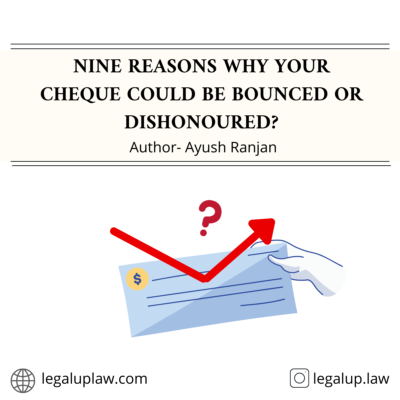Contact Information
Sector 62, Noida.
Uttar Pradesh, India.
To contact us, visit our social media handles or mail at contact@legaluplaw.com
Ayush Ranjan
My name is Ayush Ranjan, I'm a first year law student at Symbiosis Law School, Noida. I intend to bring legal content in easy language.
- Total Post (13)
- Comments (144)
Articles By This Author

9 reasons why your cheque could be bounced or dishonoured.
- By Ayush Ranjan
- . November 27, 2021
Getting your cheque bounced or dishonoured is not only unethical, it’s punishable. If your cheque gets bounced due to insufficient funds in your account, a

What happens when your Cheque bounces?
- By Ayush Ranjan
- . October 24, 2021
Cheque bounce is one of the most common financial crimes that take place. This simple crime can have consequences for the issuer of the cheque

Is applying wraps on cars legal in India?
- By Ayush Ranjan
- . October 21, 2021
Getting your car wrapped to make it stand out from all the other cars on the road is becoming the new trend. However, what do

Consumer Protection Act 1986 VS 2019: 6 key differences.
- By Ayush Ranjan
- . October 9, 2021
Consumer Protection Act 1986 was amended in 2019 as new ways of exchange of goods started taking place. The concept that a person in Bangalore

What are the legal issues that self-driving cars face?
- By Ayush Ranjan
- . September 6, 2021
Self-driving cars are slowly becoming reality now. With companies like Tesla and Volvo working tirelessly on self-driving software, their cars have already reached level 4 of autonomous driving. (6 levels of autonomous driving)

Is Marrying Twice Legal in India?
- By Ayush Ranjan
- . August 10, 2021
No, you cannot marry twice in India as the law here prohibits practising both polygamy and polyandry and even marrying twice. The only exception is if you belong to the Islam religion, then you are allowed to practise polygamy. Polyandry is not allowed even in Muslims.

What is the difference between Polygamy Vs Polyandry?
- By Ayush Ranjan
- . August 9, 2021
Polygamy is a practise where a man can marry multiple woman whereas Polyandry is a practise where a woman can marry multiple men and maintain marital relations with them at the same time.

Blundell Leigh v. Attenborough – Contract Of Pledge
- By Ayush Ranjan
- . July 25, 2021
The landmark judgement of Blundell Leigh v. Attenborough is widely referred to understand that the delivery of goods does not have to be contemporaneous which means that the contract for pledge and delivery do not have to be done at the same time. The delivery of goods can be made before the advance, which in turn constitutes a pledge as soon as the advance is made.

How do politicians with criminal charges fight elections?
- By Ayush Ranjan
- . July 17, 2021
The act which lays down the rules for eligibility of a candidate to contest the election is the Representation of the People Act, 1951 which has no provision to ban politicians from fighting elections who have criminal charges against them.

Donoghue v Stevenson – Duty of Care in Negligence
- By Ayush Ranjan
- . June 23, 2021
The landmark judgement of Donoghue v Stevenson had a crucial role in laying down the foundation of the concept of ‘negligence’ and is widely referred to while determining the duty of care in negligence. It is also popularly known by the name of ‘Snail in the Bottle’ case.

